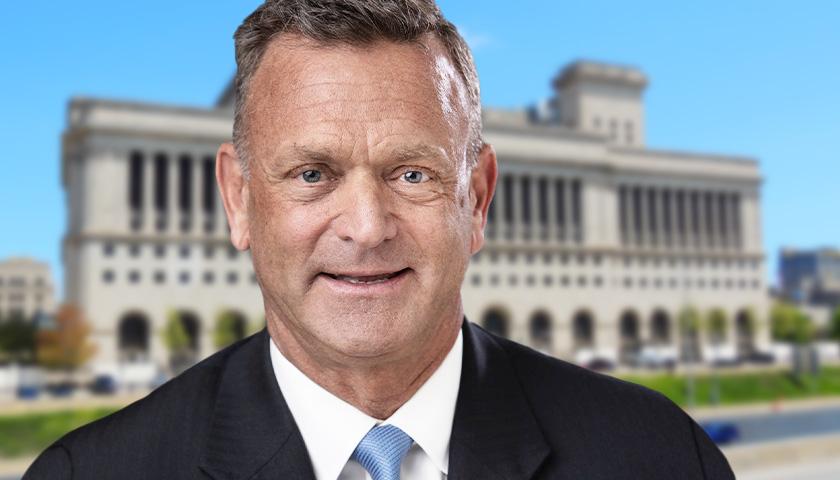Republican lawmakers this week unveiled a shared revenue plan that would boost state funds for counties and municipalities and give authority to fiscally troubled Milwaukee and Milwaukee County to set and boost sales taxes.
But will taxpayers around the Badger State be forced to pay for Milwaukee’s mistakes?
State Representative John Macco told The Wisconsin Daily Star the plan strikes a good balance between essential revenue and fiscal responsibility to taxpayers.
The Ledgeview Republican, who serves as chairman of the Assembly’s Ways and Means Committee, said the proposal delivers hundreds of millions of much-needed new money to villages, towns, cities and counties.
“In the Legislature we have tied the hands behind the back of local officials since 2012. We’ve not given them a raise, so this shared revenue piece has to get fixed,” Macco (pictured above) told The Daily Star on Thursday’s edition of the Jay Weber Show in Milwaukee.
The proposal includes $50 million in new money for counties and $176 million targeted for towns, villages and cities. But the money may only be marked for core services, including law enforcement, fire protection, emergency medical services, public works and transportation. Every community in Wisconsin would see a minimum 10 percent increase in shared revenue, according to State Representative Tony Kurtz (R-Wonewoc).
Macco said the restrictions demand a re-funding of the police in a post- de-funding era.
“In other words, they cannot take that money and use it for a new diversity coordinator. They have to use it for police and fire,” the lawmaker said.
The idea, Kurtz said, is to take 1 cent of the state’s 5-cent sales tax — 20 percent — for the shared revenue fix. The revenue would be placed in a segregated fund for local shared revenue. As sales tax revenue grows over time, so too would funding levels for local government in the segregated fund, said State Representative Jon Plumer (R-Lodi).
Republicans also are proposing a $300 million, three-year pilot program called the Innovation Fund to encourage consolidation of services in local governments. The goal, lawmakers say, is to reduce local spending and create more efficient services.
Under the plan, Milwaukee would be allowed to put in place a temporary 2 percent sales tax. Milwaukee County could boost its 0.5 percent sales tax by 0.375 percent. It would be up to local voters to approve the tax hikes through a referendum.
At a press conference Thursday, Milwaukee Mayor Cavalier Johnson said the additional revenue would help fix the city’s badly broken pension system. Unfunded liabilities are soaring, with estimates showing the city’s annual contribution will rise from around $71 million to $150 million. It is expected to remain elevated for years to come, the Milwaukee Journal Sentinel reported. Milwaukee County is still dealing with the lingering effects of a pension scandal 20 years ago.
The shared revenue plan and its accompanying taxing authority could be a lifeline for Milwaukee and the county. For some, it feels like a taxpayer-funded bailout for liberal governments that have made bad fiscal decisions over decades.
Waukesha County Executive Paul Farrow, the former state Republican Party chairman, called the measure a “bailout for the state’s largest city and county. And he said it doesn’t go far enough to deal with the “problems created by an outdated state revenue formula and decades of unfunded state mandates.”
“The new money provided under the proposal falls far short of what a low-tax county like Waukesha needs to fight crime, support our 911 dispatchers, and keep our roads and the public safe,” he said. “In fact, if unchanged, the new spending proposal would barely cover the cost of inflation in one year of our county budget. Making matters worse, the plan attaches just enough strings to tie our hands and prevent us from using the funds in the best way possible.”
Evers, who has pushed his own shared revenue plan with fewer restrictions and accountability to state taxpayers, had yet to comment on the Republican plan as of Friday.
Macco said the Assembly proposal makes Milwaukee address its own mistakes.
“I think they’re negotiating in good faith and they realize they have to get out and realize their first bath is the cheapest,” he said.
“They’ve got to get out of their own way and get their head out of their butt and start doing things that make sense from an economic standpoint,” Macco said, referring to the city’s poor fiscal choices over the years.
– – –
M.D. Kittle is the National Political Editor for The Star News Network.
Photo “John Macco” by Rep. John Macco. Background Photo “Milwaukee County Courthouse” by Asher Heimermann. CC BY 3.0.





